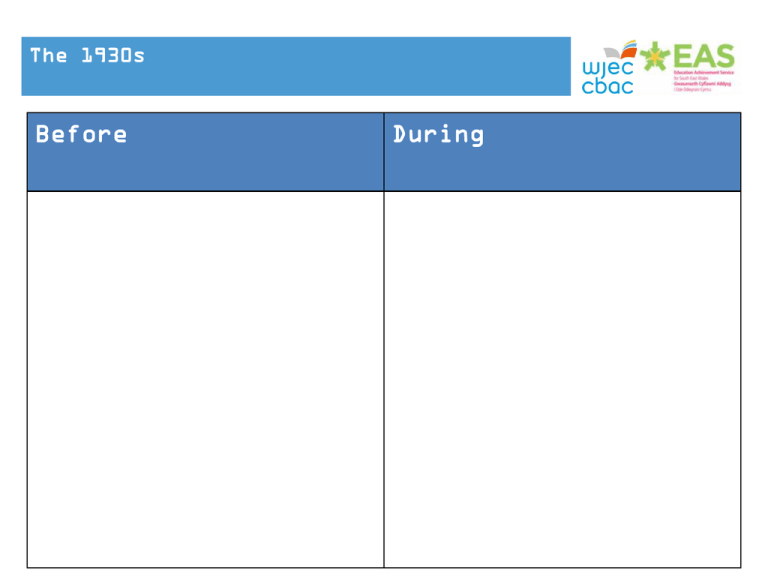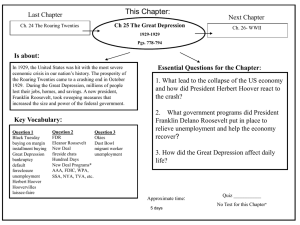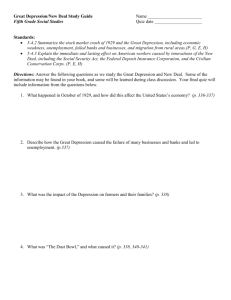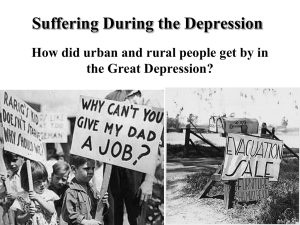Meta lesson
advertisement

The 1930s Before During Wall Street Crash In 1929, the Wall Street Crash plunged the USA into economic depression. The Americans were alarmed, so they called in their loans to other countries and put up customs barriers to stop imports of foreign goods. This created a depression across the rest of the world. Key industries closed in Jarrow sparking the Jarrow Crusade. Unemployment Unemployment in Britain rose to 2.5 million (25 per cent of the workforce) in 1933. Worst hit were the areas of heavy industry (eg coal, iron, steel, shipbuilding) in Northern Ireland, Scotland, Wales and the north of England. These industries were already struggling because they had not modernised after the war and had been badly affected by competition from other countries. The Depression meant that now these industries crumbled. For example, when the coal mine, the steel works and Palmer's shipyard closed down in Jarrow in the north-east of England, every single man in the town was made redundant and Jarrow 'died'. The people of Jarrow organised a march to London - a crusade to seek help from the government, but they were told to go home and work out their own salvation'. In fact, the government did not have a clue how to cope with the Depression, and the policies New industry In the south-east of England where new light industries such as chemicals, electrical goods and automobiles had been developed, families were affluent. In fact, people with jobs benefited from the Depression because prices fell and they could buy more! Causes of the Depression The main trigger of the Depression was the Wall Street Crash, but other factors also helped to create the Depression out of the Crash. To understand them, you need to understand that the root of an economic depression is a reduction in spending, and that the way to end a depression is to get people to buy things: Import duties - Import duties discouraged trade, which harmed the economy. The reduction in trade particularly hit the shipbuilding and railway industries if there was no trade, there was no need for transport. Savings - when there is unemployment and uncertainty, people cut back on spending and save 'for a rainy day'. This then makes businesses go bankrupt and causes the unemployment they feared. Unemployment - unemployed people have no wage and cannot buy things, which causes more businesses to go bankrupt and creates more unemployment. Outdated practices - British heavy industry was out of date and labourintensive. When orders dried up, the only way they could cope was to lay off workers. Some Government actions made the depression worse: - The increase in unemployment meant the government was faced with a vastly increased expenditure on benefits. So in 1931, it raised income tax and cut unemployment pay by 10 per cent and introduced the means test. These measures reduced the amount of money people had to spend and made the Depression worse. - The Import Duties Act (1932) was designed to protect British industry, but this merely reduced trade and made the Depression worse. How did the government react? These four actions made things worse: Raising income tax. Cutting unemployment pay by 10 per cent. Introducing the means test. Adding import duties to goods from abroad. These four actions helped to end the Depression: Came off the gold standard - this allowed the government to increase the amount of money in circulation. Reduced interest rates - this reduced people's debt payments and made more money available to spend, but also encouraged them to take out loans to spend more. The Special Areas Act (1934) - tried to attract light industries to the 'distressed' areas. Local councils built 500,000 council houses, which pumped money into the economy. Benefits of the Depression Some people (especially in the south of England) become more affluent during the Depression: Prices fell in the Depression, which meant more money for luxuries. Hire-purchase allowed people to get luxuries 'on the never-never'. Family size fell, which meant more money for luxuries. Improvements at work such as reduction in working hours, holidays with pay. Holidays (at the seaside). Three million new houses were built in the 1930s. There was a 1200 per cent increase in homes with electricity. Huge increase in car ownership. Vacuum cleaners and washing machines. Radios and the first TVs. Better leisure such as cinema, dance halls, swimming baths and football matches. Acknowledgements Jarrow Crusade. Pictorial Press Ltd / Alamy Stock Photo






